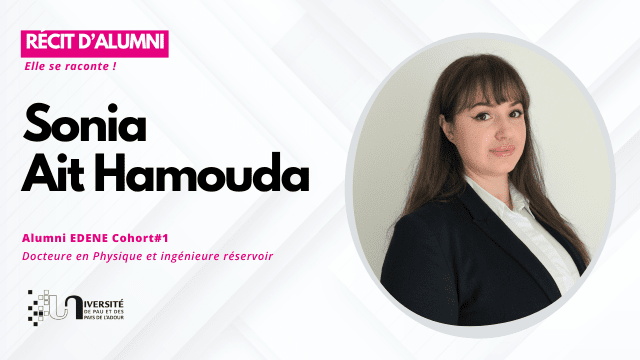Sonia Ait Hamouda, Doctor of Physics and reservoir engineer, alumni EDENE Cohort#1
Your doctoral journey
What are you most proud of in your doctoral journey?
I am especially proud of having developed an innovative physics-based image registration algorithm, designed to create a digital twin of a solid-state battery cell from tomography images. This digital twin allows us to predict the internal temperature distribution and detect early-stage degradation — a major step forward for battery safety and monitoring.
To validate this approach, we conducted a dynamic in-situ experiment using the Tescan UniTOM XL CT scan, focusing on a bilayer system. The experiment yielded remarkably clean and precise data, offering strong support for our model and confirming experimentally the relevance of our methodology.
This work also sparked interest from the Technology Transfer Acceleration Companies (SATT), and discussions have started around the potential for a patent application.
Finally, a particularly rewarding moment was receiving the Elsevier Student Talk Award for Best Oral Presentation at the ICTMS (International Conference on Tomography of Materials and Structure 2024) Conference in South Africa, where I presented this work to an international audience. Being recognized on such a stage was a true highlight of my PhD journey.
What are the impacts of your research on the academic, socio-economic, or environmental areas?
My PhD project is part of the EDENE programme, which promotes high-impact research in the fields of energy and environment. From the outset, my work has been driven by the ambition to contribute to the development of more efficient, reliable, and environmentally friendly energy storage systems.
In particular, I focused on solid-state batteries, a promising technology that supports the energy transition by reducing dependency on fossil fuels and addressing the anticipated rise in global electricity demand. To highlight the broader context of this research, I dedicated an entire chapter of my thesis to introducing the energy transition and the role of electric storage technologies, laying the foundation for the scientific and environmental motivations behind the project.
My work is also in line with the University of Pau’s interdisciplinary mission of “Energy Subsidiarity at the Territorial Scale,” aiming to support local-scale sustainable energy solutions. Moreover, by helping to understand and predict battery degradation, my research aligns with the United Nations Sustainable Development Goal #7: Affordable and Clean Energy. These combined aspects highlight both the academic relevance and the socio- environmental impact of my thesis.
Your experience at UPPA
How did you experience your PhD journey at UPPA and within the EDENE programme?
The EDENE programme provided a unique framework that greatly enriched my PhD experience. From the very beginning, the programme emphasized visibility and connection with industrial partners, which played a key role in shaping my career perspective. I was fortunate to benefit from an industrial mentor from TotalEnergies and to take part in visits to major industrial sites, such as TotalEnergies in Pau and in Feluy, Belgium.
The training opportunities were also a major asset. I followed numerous scientific and professional development courses, including specialized sessions on tomography, programming, and transferable skills. These trainings helped me grow both as a researcher and as a future professional.
At UPPA, I found a supportive and well-equipped environment that allowed me to carry out my experiments under excellent conditions. I received strong technical support — especially during the experimental phase — and had access to advanced instruments, which were essential to the success of my research. Overall, this experience has been both technically enriching and professionally empowering.
What skills did you develop over the years (scientific, transferable, interpersonal…)?
Coming from a background in Oil & Gas, this PhD allowed me to significantly broaden my perspective towards emerging energy technologies, especially in the field of solid-state batteries. I explored this topic through extensive literature work and by applying advanced X- ray computed tomography as a non-destructive method to analyze battery degradation — which I now deeply appreciate for its precision.
Throughout the project, I also developed strong skills in numerical modeling and Python programming, particularly through the creation of a digital twin of the battery and the implementation of a physics-based image registration algorithm. These were highly challenging but rewarding areas where I gained deep technical expertise.
Presenting my work at several conferences — from local interdisciplinary events to highly specialized international tomography conferences — taught me how to adapt my scientific communication to a wide variety of audiences. This helped me grow as a speaker and science communicator.
Finally, I treated this PhD as a true project to be managed, with timelines, milestones, and deliverables. I used tools such as Trello to organize my workflow and stay on track with experiments, writing, training, and conference deadlines. Along the way, I took several soft skills trainings, including time management and resilience, which helped me cultivate a strong and adaptable professional profile — fit for both industry and research careers.
Your career perspectives
How did your professional project come to life and how did it evolve throughout your journey?
I have always been attentive to current global challenges, particularly those related to the environment and energy. As the world shifts toward more sustainable solutions, I became increasingly aware of how these issues impact not only the industry and the research world, but also our everyday lives.
This awareness naturally led me to broaden my field of interest beyond Oil & Gas, and to explore new energy technologies — especially those that support the energy transition. For me, focusing on solid-state batteries and their performance was not just a scientific opportunity, but a way to contribute to a global transformation already underway.
My PhD gave me the chance to work at the intersection of environmental responsibility, innovation, and advanced technology. It confirmed my desire to remain involved in meaningful, forward-looking projects that align with the urgent need for cleaner, smarter energy systems.
How did being part of the H2020 MSCA COFUND EDENE programme influence your career path?
Being part of the EDENE programme had a deep and lasting influence on my professional mindset. It encouraged me to carry out my research with scientific integrity, ethical awareness, and a strong sense of responsibility toward climate challenges and the energy transition.
The values promoted by the MSCA COFUND initiative were not just theoretical — they were reflected in the very essence of my PhD project, which focused on developing innovative tools to support more sustainable battery technologies. This alignment between scientific excellence and environmental relevance helped shape my ambitions and gave me a clear direction for the future.
Through this programme, I gained valuable insight into the real-world impact of research, and it opened new perspectives for me in the fields of clean energy, sustainable innovation, and interdisciplinary collaboration.Want to know more?
The EDENE doctoral programme, funded by the European H2020 Marie Skłodowska-Curie COFUND initiative and managed by the University of Pau and Pays de l’Adour (UPPA), aims to train international researchers in the fields of energy and the environment. By promoting an interdisciplinary, intersectoral, and international approach, the programme helps strengthen the impact of research on these major challenges. Between 2021 and 2026, 30 high-potential international PhD candidates were recruited, bringing substantial added value to scientific and technological innovation in these strategic areas.

Comments0
Please log in to see or add a comment
Suggested Articles


